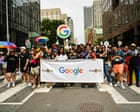Tony Blair’s powerful thinktank asked ChatGPT how AI might affect public sector jobs. Critics say the results were … wonky
• Don’t get TechScape delivered to your inbox? Sign up for the full article here
What will AI do to employment? It is, after “will it kill us all?”, the most important question about the technology, and it’s remarkably hard to pin down – even as the frontier moves from science fiction to reality.
At one end of the spectrum is the slightly Pollyannaish claim that new technology simply creates new jobs; at the other, fears of businesses replacing entire workforces with AI tools. Sometimes, the dispute is less about end state and more about speed of the transition: an upheaval completed in a few years is destructive for those caught in the middle of it, in a way that one which takes two decades may be survivable.
More than 40 per cent of tasks performed by public-sector workers could be partly automated by a combination of AI-based software, for example machine-learning models and large-language models, and AI-enabled hardware, ranging from AI-enabled sensors to advanced robotics.
The government will need to invest in AI technology, upgrade its data systems, train its workforce to use the new tools and cover any redundancy costs associated with early exits from the workforce. Under an ambitious rollout scheme, we estimate these costs equate to £4bn per year on average over this parliamentary term.








More Stories
Exercise ‘better than drugs’ to stop cancer returning after treatment, trial finds
Cancer experts warn of coffee enemas and juice diets amid rise in misinformation
Elon Musk shows he still has the White House’s ear on Trump’s Middle East trip